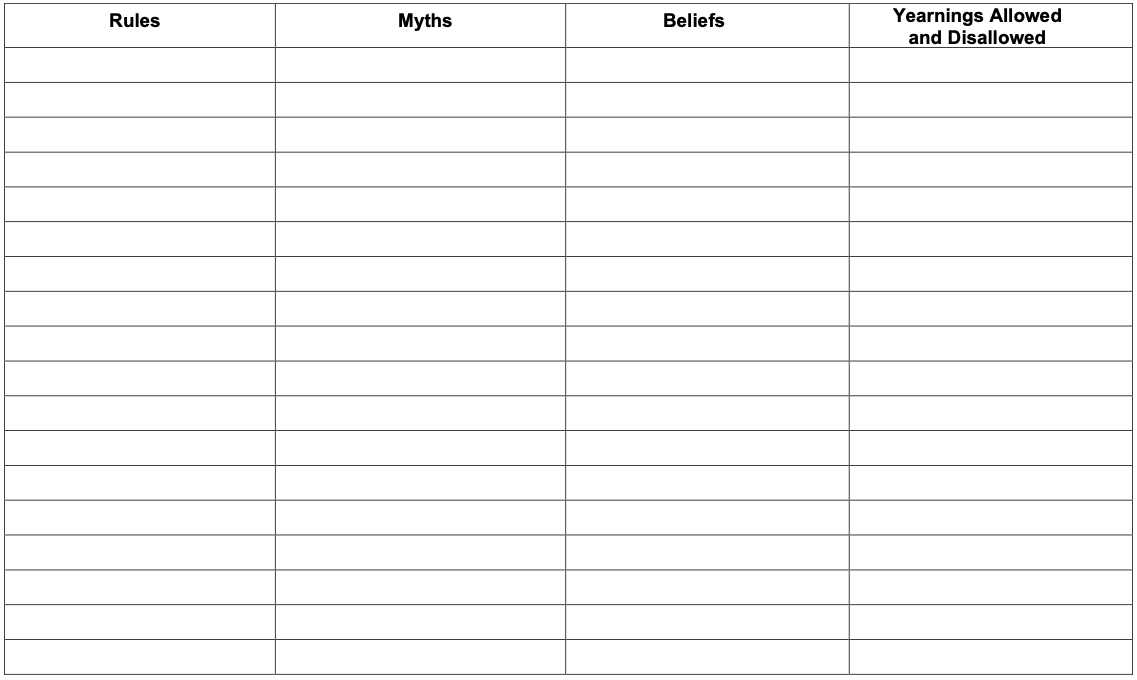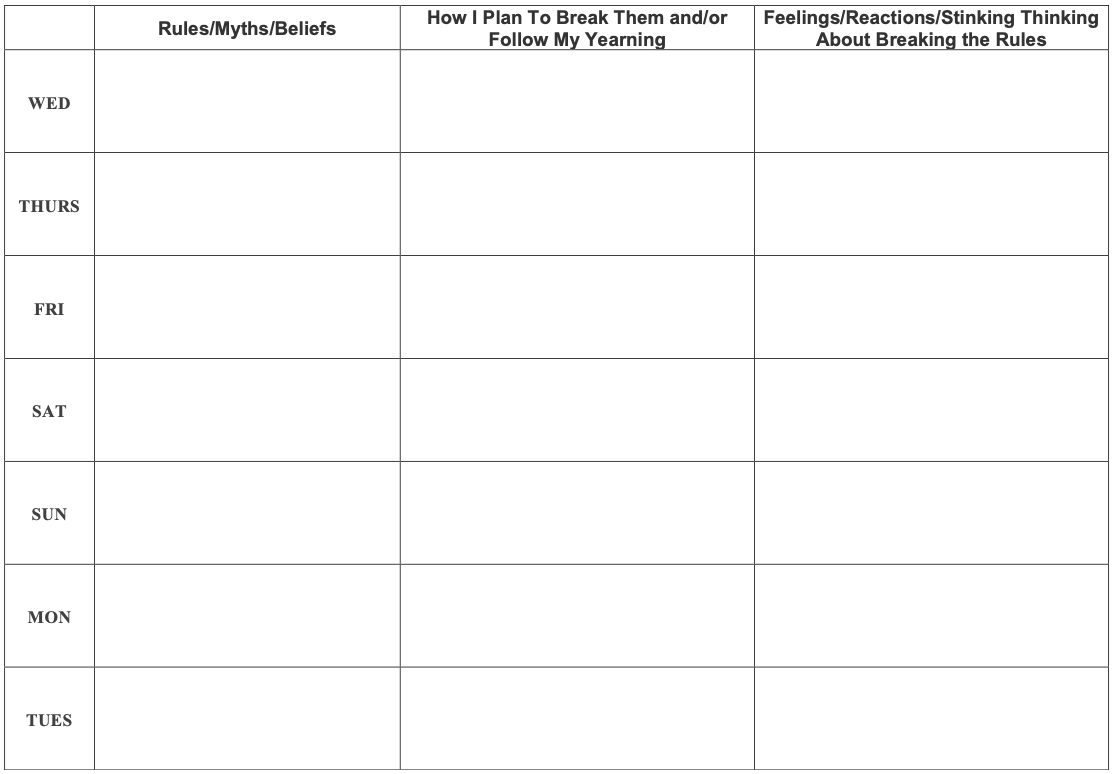INVISIBLE CHAIN
NOT ACTUALLY MAD AT ME
Our families are our source of social conditioning in the world. It is from our families that we develop our perspectives and beliefs about ourselves and the world around us. It is one of the functions of a family to socialize their children and pass on the culture and the beliefs of the family and the society they live in. Our families provide the programming, the “software,” for how we process information and interact with the world.
Our programming helps us become members of our families and to be conditioned to the society around us. Yet this programming is limited to our family’s own previous awareness, conditioning, experiences, training, etc. Without conscious review, we will remain at the effect of our programming and accept our family beliefs as absolute truth, not just as beliefs our family holds. Or we may reject our family’s beliefs but not construct positive beliefs to take their place. In any event, we are still ruled by our family beliefs through blind acceptance of them or reaction against them.
We unconsciously accept and repeat the thoughts, behaviors, and perspectives of our family, see the world through their lens. We are often unaware of this conditioning and accept it as “the way it is.” To the extent that we can perceive our family’s rules, myths, and beliefs, we can consciously choose to accept those that serve us—and release those that don’t. We can consciously choose what we wish to believe is consonant with our highest vision. Choosing to operate from our own consciously chosen principles, values, and beliefs is key to differentiating and individuating.
The powerful awareness of our family’s conditioning—their myths, rules, and beliefs—frees us to see possibilities that would have been hidden to us before. We are able to see what beliefs limit us and which ones empower us. By shifting this perception, we are able to form beliefs that can bring us closer to ourselves and to others. We are able to see what beliefs and rules block us from tapping our deeper yearning that leads to greater intimacy, facilitated by greater self-love.
We are able to create our own reality, rather than just unconsciously accepting our conditioning. This ability frees us to break the rules that no longer serve us, develop new programming, and create relationships and experience the world on our own terms. We can then choose beliefs that lead us to self-love and fulfilling intimacy.
This week, you begin to identify the invisible chains that bind you to certain behaviors and routines. You see how your family rules, myths, and beliefs are interwoven into your daily life and discover the underlying drivers of your actions.
Become Aware of Your Programming and Follow Your Yearnings
Becoming aware of your programming helps you to understand yourself—how you became who you are, why you behave or feel the way you do, what your motivations are, why things bother you, and how you interact with others. As you become more aware of your unconscious programming that occurred in family interactions in your early childhood, as well as the messages and training you have received, you become more able to express repressed yearning and consciously choose your thoughts, feelings, and behavior.
With awareness, you can choose to respond consciously, rather than with unconscious, reactive, reflexive responses. You can begin to consciously consider your beliefs, rather than blindly and unconsciously adopt them. You can then recognize previously denied yearnings and consciously decide to express them in new ways, to experiment with new ways of being, and to accept or reject original family programming. However, without this conscious awareness, you will either operate from them or reject and rebel against them without being fully aware. You will be reacting to your programming, rather than consciously creating your life.
While our primary programming develops through our relationships with our family, there are many cultural influences that impact our beliefs and govern our behavior. This week, explore your family rules, myths, and beliefs, as well as cultural beliefs about relationships. You recognize your repressed yearnings, and experiment with the first Rule of Engagement: Accentuate the Positive as a tool that helps you follow your yearning. Unlike programming you may have received in your family, accentuating the positive does not mean being nice, being fake, or avoiding conflict. Quite the opposite. Accentuating the positive means engaging with those in our lives in moment-by-moment ways. It means following yearnings, expressing feelings, and staying present, accessible, responsive, and connected. We all yearn to connect, so use this assignment to connect and establish more authentic, empowering relationships in your life.
As you become more aware of your programming and identify the rules, myths, and beliefs that inform beliefs about and attitudes toward the world, document them in your journal to capture your revelations in the moment.
We can consciously choose what we wish to believe that is consonant with our highest vision.
Name and Break Your Family’s Rules, Myths, & Beliefs while you Accentuate the Positive
Your main assignment this week has two parts:
PART 1: Become aware of your family myths, stories, beliefs, and rules and see how they play out in your daily life.
What does your family believe about the world and aspects of the world? What are family rules that govern your behavior? What are the stories and myths that your family tells? What were you taught by example, by were rewarded, or punished, or ignored? What areas of your Love Sponge were watered and which ones weren’t? What feelings and ways of being were deemed okay, and which ones weren’t? Think about the messages you have received from your family.
PART 2: Pick a family rule and break it in as many ways as you can. Specifically, Accentuate the Positive by following your Yearnings.
Now that you see what these beliefs and rules are, pick one and break it as many ways as you can! If your family rules were to be seen and not heard, then be loud this week! If your family rules were to not brag and draw attention to yourself, then brag, brag, brag. If your family rules were to not yell, then yell! If your family rules were to hide your feelings, let them out! Have fun breaking the rules and liberating new yearnings!
One significant way to focus on breaking your family rules is to follow the Rule of Engagement to Accentuate the Positive. You accentuate the positive by following your yearning directly, rather than doing all of the indirect behaviors or avoidances your family used to avoid deep engagement in connection. Your family did not teach you to follow your yearnings, express feelings, stay present, or to be accessible, responsive, and connected. But this week, you break one of those family rules, myths, or beliefs by going for this directly. Be aware of the attachment breaches you experience while breaking your family rule this week. You may be afraid that you won’t be loved, won’t belong, or won’t be okay if you don’t obey the family rules. You may be hurt and have breaches as you do this. Look at the beliefs behind your breaches—and look at what you are learning.
Very-Able Assignments
Free Associate
Use the sample worksheets to free associate on different topics to help you unearth your family rules, myths, and beliefs. Under each category, write as many related thoughts, opinions, reactions, etc. as fast as you can. (Feel free to add other categories if they come up for you.) Don’t edit what you write, let yourself just write and write for at least two minutes on each topic:
Men
Women
Relationships
Communication
Emotions
Conflict
Friendships
Money
Success
Sex
Work
Service
Values
Lifestyle
Finding Family Rules, Myths, and Beliefs
Use what you unearthed from the last exercises. Review what you wrote and see what rules, myths, and beliefs surfaced through your writing. How does what you wrote or said reflect your beliefs or family rules? What yearnings were allowed or disallowed? Record these on your worksheet with a column each for Rules, Myths, Beliefs, and a fourth column to record yearnings allowed and disallowed. Throughout the week, continue to fill in the columns of Rules, Myths, and Beliefs that you have from your family, and note what associated yearnings you discovered were allowed and disallowed.
Love Sponge: Start to See Your Family Beliefs at Work in Your Life
Start to see how your family beliefs are at play in your life. Look for evidence at work, at home, and in your relationships. And, if you haven’t been able to really see your rules and beliefs, look at your relationships, your home life, your work, etc. What beliefs does your life evidence suggest to you?
Your beliefs are playing out in every moment of your life. To what degree do your actions show that you believe you are loved and okay or that you have to earn love by obeying the rules?
To what degree do your actions, ways of being, and results reveal that you believe that the world is a safe and abundant place and that you can depend on others to support you or that you have to watch out, can’t depend on others, that there isn’t enough love (time, money, etc.), or that you have to do everything yourself?
Set a timer for every hour and ask yourself what rules you were following during that hour; what beliefs were driving you. Were you doggedly working to prove your worth because your family belief is that you only have value if you produce? Were you feeling scared because you didn’t have enough time/money/energy— reflecting that you believe in scarcity? Did you back down from a confrontation because you were taught the rule is to not rock the boat? Were you judging yourself or others? Your prejudices and judgments about yourself and others are indicators of your beliefs. Watch your daily activities to see how they are the outcome of your beliefs.
A Category a Day: Find Rules, Myths, and Beliefs—and Break Them!
You may choose to focus on a category each day to deepen your awareness of your rules, myths, and beliefs. Think about family programming around work or play, lifestyle or money, or…Then break rules within that category that day. Perhaps you take on family rules about work one day and realize that while your family said you should work hard, they also complained all the time. So, break the rules and enjoy your work, brag about how much you are doing, and celebrate. Maybe the rules in your family were to be happy all the time— so this week let all your feelings flow. And maybe one day you choose to focus on your beliefs about money, and see what rules show up, etc.
Free Associate
Read the words below and write as many thoughts, ideas, judgments, feelings, etc. that come to mind. Write as fast as you can; don’t edit—let anything that comes in your mind be recorded by your pen. Write for two to five minutes on each topic.
Men
Women
Relationships
Communication
Emotions
Conflict
Friendships
Money
Success
Sex
Work
Service
Values
Lifestyle
Rules, Myths, & Beliefs
Challenge Beliefs, Break Rules
Challenge Beliefs, Break Rules (cont’d)
Family Rules, Myths & Beliefs Areas of Life
Fill in Your Love Sponge
What areas of your Love Sponge were watered and which ones weren’t? What feelings and ways of being were deemed okay, and which ones weren’t? Think about the messages you have received from your family and fill in your Love Sponge to increase your awareness.








